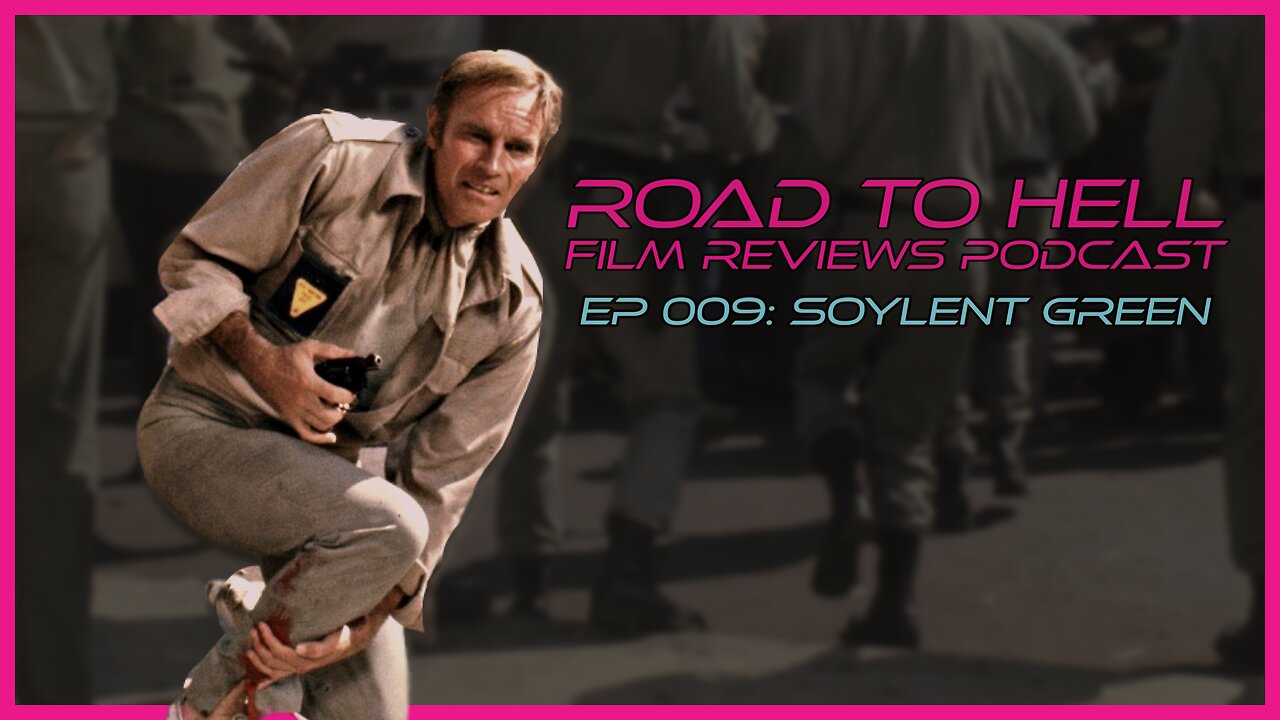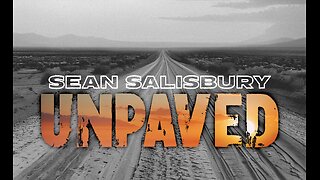Premium Only Content

Soylent Green Review: Road To Hell Film Reviews Podcast Episode 009
In today's episode, Nicky P and Danny review Soylent Green a film classic starring Charlton Heston in a post apocalyptic world ruined by global warming.
What's To Review In Soylent Green?
The year is 2022; the place, New York City. The world is on fire. A rash of heat waves has completed the desertification of Planet Earth, drastically reducing the global food supply and subjecting the majority of the population to lives of squalid poverty. New York is hot, dirty, and over-crowded. Only the elderly can recall a time when streams flowed freely, when deer roamed the woods, and when singing birds sailed in the sky. Only the elderly can remember a time when real food—steak, strawberries, apples, and cheese—was taken for granted. In 2022, with global agriculture nearly scorched out of existence, the only readily-available comestible is “Soylent,” a wafer apparently made from the ocean’s plankton.
When a former director of the Soylent Corporation is found brutally murdered in his home, the cynical detective Robert Thorn is assigned the case. Soon encountering political pressure to drop the case, Thorn—along with his archivist friend Sol—discover that the dead executive was enmeshed in a mysterious and sordid conspiracy which, in the end, nearly drove him mad. Though hotly pursued by corporate hitmen, Thorn vows to uncover the conspiracy at the center of the Soylent Corporation and to prove it to the world.
In this edition of The Road to Hell, Nicky and Danny discuss the meaning behind this sci-fi classic (while also addressing the film’s implicit and explicit reliance upon the controversial issues of man-made climate change and overpopulation). He who controls a nation’s food supply controls the nation. In Thorn’s 2022, the Soylent Corporation effectively controls America. Dive into the nightmarish world of monopolies and corporate crime, and discover the secret of “Soylent Green,” in this episode of The Road to Hell film review podcast!
A Tropical Planet And Accidental Cannibalism
In today's episode, we begin with Danny laying out his reasoning behind loving the film. He sees it as being a gritty archetypal police thriller with some strange dreamlike qualities. My own thoughts are slightly less enthusiastic. I see the film as a thinly veiled excuse to propagandize the fear of global warming. The flawed idea of global warming in which the entire planet continuously heats up is a fantasy used to push fascist plans of the elites. The way global warming would actually play out is by making a tropical planet with a better ability to produce plants and derivatively the things that eat plants.
Politics aside, the heart of the story is Detective Thorn investigating a murder of a high-ranking member of the Soylent company. This leads down a rabbit hole ending in the unsettling secret at the heart of the dystopian society created in the film. The Soylent company which makes all the food required by an overpopulated planet, ostensibly out of plankton. But with loads of living people being scooped up and taken away and few people asking questions we have to wonder if the people are conditioned to ignore the obvious clues to the real origin of their food supply. The parallels to our own world give me shivers.
A Hard World Makes Hard People But Humanity Lives On
One of the first ideas that they hammer home is how different the world is. There are several scenes that show us that the standards of humanity have changed, the best of these include Detective Thorn. Thorn behaves like an aggressive, self-seeking, opportunist. He pilfers crime scenes for his own gain and bullies all witnesses to his own end. There's a scene in which Thorn is ransacking the dead man's apartment. He appears to be simply stealing things like meat, which have become luxuries in a world of scarcity.
The truth is that even in a hard world not all of our humanity drains out. In another scene, Thorn interacts with a group of women companions, including one who belonged to the victim. Thorn interrupts and threatens the man acting as the defacto pimp for the women in his building for no direct gain for himself. In yet another scene Thorn refuses to back off of the case despite being directed to by his superiors. Despite the changes present, Thorn's humanity remains as intact as it can in the context of the world.
Can Civility Reign In A Collapsing Society
One of the big talking points we notice is the sexual environment of the movie. There are a number of interactions between Thorn and the female characters in the movie. Women are basically reduced to the playthings of the powerful men around them. This does not suggest that they aren't human but that there are serious changes in the gender roles of this far more scarce world.
There is an implication that material conditions have a marked effect on the roles of individuals in society. In a world based on absolute physical power as a byproduct of scarcity, the progress of our civilized society feels like a reaction to our material comfort. I make mention of a point Jack Spirko makes about nations where violence reigns as a result of food scarcity. This is alleviated by the complex systems we have in place and when those systems collapse can we maintain our "civilized" natures when the world is no longer guaranteeing our luxury.
One remarkable scene is the meal that Thorn and Saul, his elderly roommate, enjoy after looting the rich man's home. Thorn eats real food for the first time after a life of plankton. You have to appreciate the genuine interaction between these two over this meal. It is a small glimpse into the world we know within the context of Thorn's pitiful existence. Both Danny and I speculate on Thorn's reaction to the meal.
A Truth Too Terrible To Live With
Getting toward the end of the film we arrive at the separate ways both Saul and Detective Thorn arrive at the horrific realization of the film. Saul brings the books he received from Thorn to the exchange, a group of individuals who had careers like doctors and lawyers in the old world. They come to a realization that whatever they have been eating it cant be plankton because the oceanographic reports show there is not near enough in the oceans for the population. They look at the world around them and there is only one alternative available.
Now that Saul knows that their life is a horror he decides he wants to go "home." Home is an assisted suicide facility that surrounds the willing participant with classical music and images of the beautiful natural world that used to be. The key to the scene is the beautiful images of the world as it was, set against the images of Earth's destruction we started the film with. Thorn arrives just in time to watch his friend die, but moreover, he sees the world his friend could never capture in words for him. The emotional moment sets up the final act of the movie where Thorn finds his final resting place is to be ground into food.
As an observation, we note the victim of the original crime was so affected by the knowledge of Soylent's secret that he needed to confess to a priest. This is not a place a person of wealth would ever be found in this world. Churches exist as homeless shelters in this world of overpopulation. The priest is the first person to choose death over the knowledge of the secret. This makes us speculate on what happens after the final scene of the movie.
The Soylent Corp Were The Good Guys And Environmental Heroes
We chose to watch Soylent Green as a companion of sorts to Children Of Men. Both films cover population and civilizational collapse. I note that I only remember seeing one child in this film mirroring the world of Children of Men. Danny says that the same documents that were relevant in the previous film are still relevant here. The most notable is Malthus.
In my mind, one of the great villains of history, the ideas Malthus spread are completely counter to the truth of history. In reality, wealthy nations struggle to even meet replacement levels. People only populate when survival is in question. For a variety of reasons including our modern chemical world and natural human instincts overpopulation isn't an obvious outcome. As an added note, Danny questions whether the Soylent company is the good guy in this film to those who subscribe to Malthusian premises as adopted by the modern environmental movement.
It's About Control Not The Environment
In the final segment of the show Danny and I discuss the modern environmental movement's degradation of human beings to "just any other animal." This is sad in comparison to the Christian mindset that human beings are something greater and are here to be stewards of the environment. The modern environmental movement captures the emotional fear we all share at the degradation of nature as a means to push fascist laws separating us even further from the world that we need to survive.
As a final note, I bring up what I see as a far greater risk to human success within the environment, soil depletion. Many of the ideas posited by the heads of the MEM are actively detrimental to repairing our soil. Danny also notes that fixing the true issues we face is complex and makes for bad political slogans whereas creating a single villain like CO2 makes for a simple mobilization strategy where your goals are political and not in fact environmental.
Hopefully today's discussion of Soylent Green has left you with new eyes and a greater understanding of the world around you. So go out into the world but remember keep one eye on the screen and the other over your shoulder.
Director
- Richard Fleischer
Writers
- Stanley R. Greenberg
- Harry Harrison (author of Make Room! Make Room!)
Starring
- Charlton Heston as “Thorn”
- Edward G. Robinson as “Sol”
- Leigh Taylor-Young as “Shirl”
- Brock Peters as “Hatcher”
- Chuck Connors as “Fielding”
Soylent Green Review Resources & Extra Media
- Soylent Green (1973): https://www.imdb.com/title/tt0070723/
- “Soylent Green – Film, Literature, and the New World Order” – The Corbett Report: https://www.corbettreport.com/soylent-green-film-literature-and-the-new-world-order/
Shill
Want to learn more about the Utopian Project throughout history or have an interest in esoterica & the classics? Check out Danny's work @ Story Of Nowhere or the Story Of Nowhere Library.
Need help connecting with your audience for your business or creative endeavor? Check out Nicky P @ Iron Age Marketing
-
 1:49:02
1:49:02
Russell Brand
3 hours agoTrump THREATENS China “NOBODY is getting off the hook” As Trade War INTENSIFIES! – SF565
100K32 -
 1:04:26
1:04:26
Sean Unpaved
3 hours agoRory's Masters Glory!, NBA Play-Ins Preview, Tennessee Moving On From Iamaleava?
20.6K -
 9:00
9:00
Film Threat
4 hours agoWARFARE | Film Threat Reviews
1605 -
 1:04:04
1:04:04
Timcast
3 hours agoDemocrat Governor's Home FIREBOMBED, Liberal's Luigi Mangione Effect Driving INCREASE In Violence
159K149 -
 1:57:44
1:57:44
Steven Crowder
6 hours ago🔴 The Most Un-American School Suspension of All Time & The New Worst City in America
356K273 -
 2:05:42
2:05:42
Nerdrotic
7 hours ago $3.82 earnedHarry Potter Casts BLACK Snape | Dr Who Hits New LOW - Nerdrotic Nooner 479
69.9K30 -
 1:00:38
1:00:38
The Tom Renz Show
2 hours agoMaking Health & Health Freedom a GOP Priority & How Do We Fix Georgia?
36.8K5 -
 49:44
49:44
Kyle Fortch
6 hours ago $0.30 earnedWillie Boy: New Song With Eminem, Collaborating w/ The Game, Dave East & More | THE ONE SHEET S1E12
26.4K -
 1:20:29
1:20:29
Rebel News
2 hours ago $2.24 earnedMontreal cops arrest journalist, Poll shows Cons lead, Poilievre's justice reform | Rebel Roundup
29.5K20 -
 47:28
47:28
The White House
4 hours agoBilateral Meeting with the President of the Republic of El Salvador
54.6K18